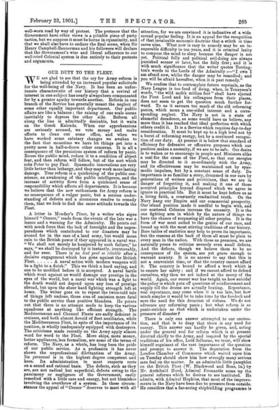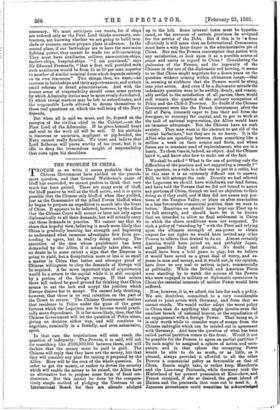OUR DUTY TO THE FLEET.
WE are glad to see that the cry for Army reform is being attended by an increased popular solicitude for the well-being of the Navy. It has been an unfor- tunate characteristic of our history that a revival of interest in one subject has nearly always been compensated for by a greater apathy towards another. Reform in one branch of the Service has generally meant the neglect of some other equally important department. Our public affairs are like a balance ; the raising of one scale seems inevitably to depress the other side. Reform all along the line is admittedly desirable, but it waits on the Greek Kalends. When our apprehensions are seriously aroused, we vote money and make efforts to clean out some office, and when we have worked some salutary changes we awaken to the fact that meantime we have let things get into a pretty mess in half-a-dozen other concerns. It is all a consequence of the pernicious system of reform by panic. Rouse the public mind, reduce it to a condition of abject fear, and then reform will follow, but of the sort which robs Peter to pay Paul. Spasmodic innovations are very little better than lethargy, and they may work more lasting damage. True reform is a quickening of the public con- science, an awakening of the public intelligence, and the increase of activity flows from a quickened sense of responsibility which affects all departments. It is because we believe that the new enthusiasm for Army reform is no consequence of a vulgar panic, but a serious under- standing of defects and a strenuous resolve to remedy them, that we look to find the same attitude towards the Fleet.
A letter in Monday's Times, by a writer who signs himself "Censor," reads from the events of the late war a lesson and a warning for the Admiralty. He points out with much force that the lack of foresight and the unpre- paredness which contributed to our disasters may be atoned for in the case of a land army, but would mean ruin to the British power if they appeared in a naval war. "We shall not merely be hampered by such failure," he says, "we shall be destroyed by it instantly, irretrievably, and for ever. There is no tout peut se re'lablir after a decisive engagement which has gone against the British Fleet A naval action with modern weapons will be a fight to a finish." This we think a hard saying, and one to be modified before it is accepted. A naval battle which went against us would damage our prestige in the eyes of the world, but a naval war which was a fight to the death would not depend upon any loss of prestige abroad, but upon the sheer hard fighting strength left at home. The writer goes on to repeat the twice-told tale of things left undone, those sins of omission more fatal to the public service than positive blunders. He points out that there is no attempt made to keep the various squadrons at anything like efficient strength. The Mediterranean and Channel Fleets are sadly deficient in cruisers, and both almost devoid of fleet auxiliaries, while the Mediterranean Fleet, in spite of the importance of its position, is wholly inadequately equipped with destroyers. The criticisms made recently on the Army apply almost word for word to the Fleet. More ships, more money, better appliances, less formalism, are some of the terms of reform. The Navy, as a whole, has long been the pride of our public service. As a profession it has never shown the unprofessional dilettantism of the Army. Its personnel is in the highest degree competent and keen. Its administration in most respects rests on a sound and rational basis. The defects, such as they are, are not radical but superficial, defects owing to the parsimony or negligence of the Government, easily remedied with a little care and energy, but not blemishes involving the overthrow of a system. In these circum- stances the appeal of " Censor " deserves to meet with all attention, for we are convinced it is indicative of a wide spread popular feeling. It is an appeal for the recognition of that invaluable economic doctrine that a stitch in time saves nine. What now is easy to remedy may be an in- superable difficulty in ten years, and it is criminal laxity to compose the mind to sleep because the danger is not yet.. Political folly and political evil-doing are always punished sooner or later, but the folly first; and it is with much significance that the writer quotes Torring- ton's words to the Lords of the Admiralty :—" I own I am afraid now, whilst the danger may be remedied ; and you will be afraid hereafter, when it is past remedy."
We confess that to contemplate future reprisals, as the Navy League is too fond of doing, when, in Tennyson's words, "the wild mob's million feet" shall have ejected the First Lord and his colleagues from their places, does not seem to get the question much further for- ward. To us it savours too much of the old reforming panics, which mean a one-sided interest and a corre- sponding neglect. The Navy is not in a state of shameful decadence, as some would have us believe, any more than it has reached that ideal perfection with which others credit it. It is a Service which requires day-to-day consideration. It must be kept up to a high level not by a burst of reforming energy, but by a continued recogni- tion of our duty. At present it is below that standard of efficiency for defensive or offensive purposes which our position makes a necessity, if we are to be safe. Our desire is to waken or to encourage in people and Ministers alike a zeal for the cause of the Fleet, so that our energies may be directed to it co-ordinately with the Army, and its effectiveness may be maintained not by spas- modic impulses, but by a constant sense of duty. Its importance is so familiar a story, drummed in our ears by generations of writers and politicians, that we are in danger of forgetting it, and making it one of those accepted principles beyond disproof which we agree to ignore in practical life. But it must be kept before us as a living faith, a constantly readmitted truth. On the Navy hang our Empire and our commercial prosperity. Our island position made it needful to begin with, and our scattered Colonies increase the necessity. It is the one fighting arm in which by the nature of things we have the chance of surpassing all other peoples. It is the form of war most suited to the genius of our race, and bound up with the most stirring traditions of our history. Bare tables of statistics may help to prove its importance, but the reasons at the back of them all must be plain to every man in the nation. With these as premises, we are naturally prone to criticise severely even small defects. And the defects, though we believe them to be no consequence of the system, are yet grave enough to warrant anxiety. It is no answer to say that this is not a convenient time, or that the country cannot afford it. The country is bound to afford a work which is to ensure her safety ; and if we cannot afford to defend ourselves, why then we are indeed at the mercy of the world. Again, our recent war has taught us how suicidal the policy is which puts off questions of reinforcement and supply till the drums are actually beating. Repentance, real repentance, may come when it is too late, but how much simpler it would be to take time by the forelock and save the need for this dreariest of virtues. We do not advocate any reforming panic ; but what reform is so panic-stricken as that which is undertaken under the pressure of disaster ?
There is only one answer attempted to our conten- tion, and that is to deny that there is any need for energy. This answer can hardly be given, and, acting under the general zeal for reform which is at present directed chiefly to the Army, and inspired by the special traditions of his office, Lord Selborne, we trust, will show himself cognisant of the vast importance of the question and prompt to answer it. The deputation from the London Chamber of Commerce which waited upon him on Tuesday should show him how strongly many serious men feel on the matter. In an admirable little pamphlet on the British Fleet (W. Blackwood and Sons, le.) by Mr. Archibald Hurd, Admiral Fremantle sums up the general reforms which he desires to see instituted. He admits, with Admiral Hopkins, that most of the improve- ments in the Navy have been due to pressure from outside. He considers that a far-seeing shipbuilding programme is necessary. We must anticipate our wants, for if ships are ordered only as the First Lord thinks necessary, con- tractors, not knowing whether we are going to build iron- dads or cruisers, cannot prepare plant in advance. In the second place, if our battleships are to have the maximum fighting power, they cannot be made too self-sustaining. They must have auxiliaries, colliers, ammunition-ships, factory-ships, hospital-ships. "I am convinced," says Sir Edmund Fremantle, "that a fleet well provided with such auxiliaries would be from 25 to 50 per cent_ superior to another of similar nominal force which depends entirely on its own resources." Two things, then, we want,—an increase in battleships and their appurtenances and certain small reforms in detail administration. And with the keener sense of responsibility should come some system by which Admiralty duties may be more evenly distributed, by which trivial matters may be left to subordinates, and the responsible Lords allowed to devote themselves to those real questions on which the well-being of the Navy depends.
But when all is said we must, and do, depend on the energies of the civilian chief in the Cabinet,—on the First Lord of the Admiralty. If he gives himself heart and soul to the work all will be well. If his attitude is timorous or uncertain, negligent or pig-headed, the Navy. cannot really flourish. We trust and believe that Lord Selborne will prove worthy of his trust, but it is idle to deny the tremendous weight of responsibility that rests upon his shoulders.







































 Previous page
Previous page